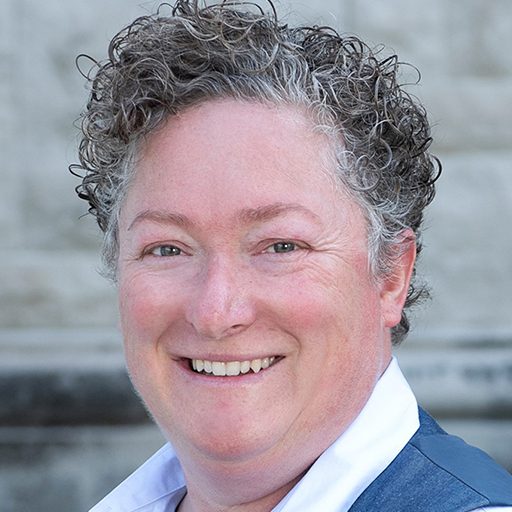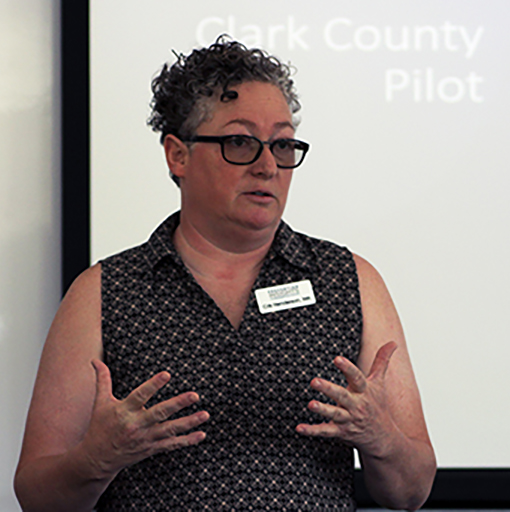Cris Henderson was working toward a master's degree in public health when they teamed up with Clark County Health Department to conduct a project on naloxone training in the county.
Through a survey of 3,000 Pulse Point users, a mobile app that sends alerts of all active emergency response calls to users, Henderson found a need to better train residents to respond to overdose situations. So, they set out to create their own program aimed at saving the lives of Hoosiers, particularly those in rural areas.
"What the survey really showed me is that Indiana is doing a good job training people to use naloxone, but we could do better," said Henderson, a research associate for Prevention Insights at the IU School of Public Health-Bloomington and project manager for the Citizen Opioid Responder (COR) Program. "So, we needed to think about training in a different way and that's what I set out to do with the creation of the Citizen Opioid Responder training."
The training is an online, 30-minute course designed to effectively prepare people for opioid overdose response. Henderson said the goal is to sufficiently educate Hoosiers on how to use life-saving naloxone to combat an opioid overdose to sufficiently educate Hoosiers – from first responders to private citizens– on how to use the life-saving naloxone drug to combat a narcotic overdose.
The program begins with a pre-test to examine the user's understanding of naloxone training, and there are interactive exercises, knowledge checks to repeat and ensure understanding, supplemental visual and audio components and a final exam.
Henderson was part of a team that received a grant from the National Institutes of Health to pilot the Opioid Rapid Response System (ORRS®) project. In this project, IU developed and tested their training course. From February 2021 to April 2021, the Citizen Opioid Responder training was piloted in two Indiana counties, Boone and Hancock. From April 2021 to December 2021, the project was expanded to Dearborn, Marion and Monroe.
Overdose deaths continue to be an issue throughout the country and Indiana is no exception. In 2021, there was a 10.3 percent increase in overdose deaths in Indiana, according to the Indiana Department of Health. Henderson's program is aimed at rural communities in which emergency response times can be greater due to the geographic footprint of the community, although they think all citizens should be trained.
"We need to shift the focus past friends and family of substance users and start to consider how to equip lay persons who are not connected to active users," said Henderson. "I wanted a program that would educate more people in the community to be engaged in overdose prevention – people that may not know anyone struggling with substance use disorder – and through this training instill feelings of confidence, capability and readiness that goes beyond textbook knowledge."
Henderson said participants in the training program reported feeling more confident and capable of responding to an overdose. The pilot program was so successful that Dearborn County made the Citizen Opioid Responder Program permanently available county-wide to all people working or residing in the county. The training program went live on Aug. 30, 2022.
Amy Rose, a tobacco treatment specialist and tobacco prevention and cessation coordinator for the Dearborn County Health Department collaborates frequently with Henderson on the Citizen Opioid Responder training. She said having people ready to respond to an overdose is lifesaving, especially in rural areas where receiving help can take time. And that help, she added, should not only be recommended for friends and family of active substance users, but for everyone in the community, from babysitters to the elderly.
"Programs like these are super important in rural communities because most of your first responders are volunteers," Rose said. "Not everybody has a full police force or EMTs to respond to emergencies. Just to have someone who can get there is awesome."
Henderson hopes to further educate Hoosiers on how and why they should help. Through the program, Henderson believes more Hoosiers will become certified and not only willing, but properly educated and capable, of saving a life.
Dearborn County is the first county in Indiana to provide the Citizen Opioid Responder training for free to their community. For more information, email Cris Henderson at naloxone@iu.edu or visit the IU prevention website.
ORRS is a registered trademark of REAL Prevention, LLC.



